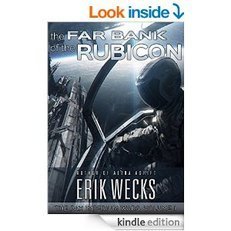Review of "The Far Bank of the Rubicon" by Erik Wecks

The Far Bank of the Rubicon by Erik Wecks (The Pax Imperium Wars: Volume 1)
Length: 309 pages (Contains Real Page Numbers)
Page Numbers Source ISBN: 1499619820
Sold by: Amazon Digital Services, Inc.
Language: English
ASIN: B00M1EH5TC
The Father of Space Opera is E.E. "Doc" Smith, a writer who I devoured as a child but is not widely read today. I've often thought that the Skylark and Lensman series were naturals for the big screen (especially the Lensman books), but I also devoured Edgar Rice Burroughs, particularly the John Carter of Mars books. I couldn't understand why no one hadn't made a great movie based on the series when you could work with a hot Martian chick named Deejah Thoris who ran around the surface of the Red Planet planet in a bikini and gave birth by laying eggs. (No, I'm not kidding.)
And then they did do the movie and just look how that turned out. So I'm out of the recommending- media-properties-for-production business. Except for my book, of course.
The modern space opera has evolved in a framework consistent with the rules laid down by E.E. In a space opera, thou shalt have:
A handsome, brave hero. (Kimball Kinnison).
A winsome heroine. (Clarissa "Samms." Go read First Lensman to understand the quotes. She's the Grey Lensman's main squeeze and genetically bred to be the perfect bride for our hero. Yeah, yeah, I can hear you gals gagging. Don't worry. In modern Space Opera, they breed boys for babes, as in the recent Honorverse tomes.)
Lots of big spaces ships. (E.E. had armored planets. THAT's space opera).
Lots of big space ships firing ray guns. (Got those in Lensman ).
Lots of ship to ship battles in space. (In Lensman , not only did you have those, you boarded the enemy space ship carrying battle axes. How does that work in hyperspace? I have no idea, but it's cooolll.)
An evil organization (Boskone).
A super evil villain running the evil organization (Helmuth of Boskone).
An ultra evil shadowy organization serving as the puppet master of the evil organization (the Eddoreans).
Lots of setbacks, spies, traitors, the death of numerous lovable minor characters, the death of a major best friend of the hero or heroine whom we've grown to love and admire, and as many twists, turns, and personal betrayals as the author thinks he/she can get away without blowing credulity into the Magellanic Clouds.
And, at the climax, a giant battle between the good guys and the bad guys with good, of course, triumphant over evil and the battle ending with just enough loose ends left untied to justify a sequel or spin-off.Oh, and the good guy and gal usually get hitched. Sometimes after the big climax (heh, heh), sometimes before, but almost always there's at least one little package delivered to dad with the first name of "Next Generation.")
So, given these time honored traditions, how does The Far Bank of the Rubicon do?
Very well, thank you. The mark of a good space opera is that if you step into it in the middle, as I did with Rubicon , you want to circle back and pick up the first book in the series to ensure you're caught up. I did and I'm caught up. The space battles are fun, the technology interesting, and the characters get under your skin. By the end of Rubicon , you've developed that pleasing compulsion to immediately buy the next book in the series to find out what happens next.
The plot of Rubicon is as follows. Our hero, Jonas, is the Prince Harry Windsor of Athena, a star state ruled over by the beneficent King Nicholas, who's caught and toasted with his royal trousers down when the evil Unity unleashes a dastardly sneak attack on the Athenan kingdom. Unity is a corporate state that feel like a cross between Stalinism and maybe the boardroom of GM in the 1950s and soon overruns most of Athena. Along the way, Jonas and his friends manage to launch a few good counterpunches, a series of compelling space battles that are an exciting hoot to read.
Despite the valiant efforts of our Prince, it becomes apparent that all will soon be lost. Jonas's older brother, King Stephen, will have to surrender his kingdom to Unity and endure a prison regimen of cold tea and soggy scones before the inevitable midnight smothering carried out by masked henchman holding those convenient wool blankets. In the meantime, Jonas and the last surviving Athenan fleet depart their home stars and head out into the void in search of supplies, allies, and ultimately, revenge.
I do have one bone to pick with Rubicon , and that's an early sex scene between Jonas and his paramour Sophia, the daughter of Athena's treacherous Duke Malek. The writing in this passage is awkward and at points unintentionally funny (Space Opera guys, watch "Gone with the Wind" to learn the best way to handle the naughty scenes. Yeah, I know. But believe me, it works out better nine out of ten times):
"He wrapped his arms around her and ran his hands over her butt, while he kissed her belly."
First of all, that sounds like a difficult position to get into. But worse, did he say "butt?!" Hey, we're talking a space princess here. They don't have "butts." They may have smoldering curves, stormy eyes, mysterious nooks, luscious crannies and shapely bottoms but never a butt!
In New Jersey, they have "butts."
This quibble aside, if you're a fan of Weber's Honor Harriman series, The Uplift Saga, or similar tales of galactic swashbuckling, you'll greatly enjoy The Far Side of the Rubicon.
Published on September 05, 2014 11:35
No comments have been added yet.



